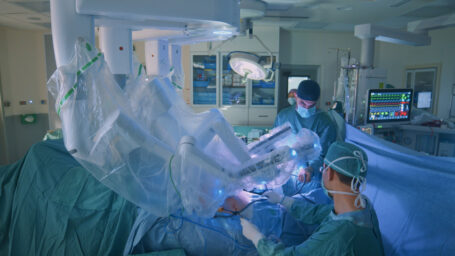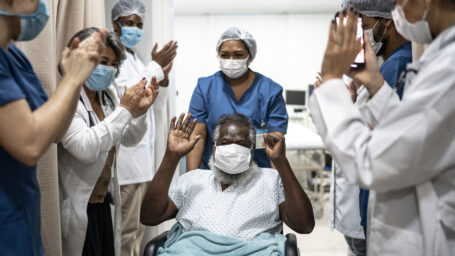The UAMS Medical and Surgical Weight Management Program offers:

A highly skilled surgical team
Our team of board-certified surgeons have specialized expertise in weight loss surgery.

Surgical Innovation
We utilize the latest advancements in technology, offering both robotic and minimally invasive approaches to bariatric surgery for enhanced precision and faster recovery.

A collaborative care team
We collaborate with obesity medicine doctors, nurses, dieticians, and psychologists to help you on your weight loss journey.

An individualized care plan
We create a personalized plan tailored to your unique health needs to ensure the best possible outcome for you.

Ongoing support
We are committed to supporting you throughout your entire pre- and post-operative journey, ensuring continuous success as you work toward your weight loss goals.
Vertical Sleeve Gastrectomy
Gastric sleeve surgery, also known as sleeve gastrectomy or vertical sleeve gastrectomy, is a type of weight-loss surgery (bariatric surgery) that helps individuals lose weight by restricting food intake. During the procedure, approximately 85% of the stomach is removed, leaving a narrow tube or “sleeve.” This reduces the amount of food the stomach can hold, helping you feel full after smaller portions. Gastric sleeve surgery is a non-reversible surgery that preserves the stomach’s functions while significantly reducing its size.
Who qualifies for gastric sleeve surgery?
Gastric sleeve surgery is typically recommended for patients:
- BMI over 40 or;
- BMI between 35 and 40 who also have significant obesity-related medical conditions like diabetes, heart disease, or sleep apnea.
Check out this BMI calculator to estimate your BMI.
What are the risks of gastric sleeve surgery?
Like any surgery, gastric sleeve surgery carries potential risks, including:
- bleeding
- infection
- pain
- heart or lung problems
- blood clots
- leak at the staple line
- significant weight loss resulting in sagging skin which may require additional surgery
- heartburn or reflux
In the long term, you may experience nutrient absorption issues. It’s important to discuss any concerns with your healthcare team to understand the risks based on your individual health.
How do I prepare for gastric sleeve surgery?
Before undergoing gastric sleeve surgery, your healthcare team will assess whether the procedure is right for you. Prior to surgery, you’ll need to participate in a bariatric surgery education program to prepare for both surgery and life afterward. This is a several month-long process which may include nutritional counseling, a psychological evaluation, and a series of physical exams and tests to assess your readiness for surgery.
What happens during gastric sleeve surgery?
During the surgery, you will be placed under general anesthesia and a large portion of the stomach is removed through small incisions in the upper abdomen. The surgery is performed laparoscopically or robotically and usually requires only an overnight stay in the hospital.
How do I recover from gastric sleeve surgery?
Patients typically spend 1-2 days in the hospital after gastric sleeve surgery. You will follow a special bariatric surgery diet for several weeks after discharge. As your stomach heals, you’ll need to adopt new eating habits, focusing on smaller, more frequent meals. After surgery, the stomach has a capacity of roughly ½ to 1 cup of food at a time so each meal will need to be small, and it’s important to eat slowly and chew thoroughly.
You may need to take a daily vitamin or mineral supplements after surgery. You will need regular blood tests in the year following surgery to monitor for issues like anemia, high blood glucose, or vitamin deficiencies.
On average, patients lose 50-60% of their excess weight within two years of gastric sleeve surgery. For example, if you are 100 pounds above your ideal body weight, you can expect to lose approximately 50-60 pounds. However, individual results may vary, depending on how well you follow the post-operative guidelines.
Some weight may be regained over time. To prevent this, continue following a healthy diet and exercise regularly. Consider joining a support group to stay on track with your new eating habits and ask your healthcare provider for trusted resources.
Robotic-Assisted Weight-Loss Surgery
The UAMS Medical and Surgical Weight Management Clinic uses the da Vinci surgical system, which provides your surgeon with an advanced set of tools for performing robotic-assisted, minimally invasive surgery.
Advantages of Robotic-assisted Weight Loss Surgery
With a highly magnified, 3-dimensional view of the surgical field, some potential benefits of robotic weight loss surgery are:
- A shorter hospital stay
- Reduced pain
- Minimal scarring
- Faster recovery
- Decreased risk of infection
